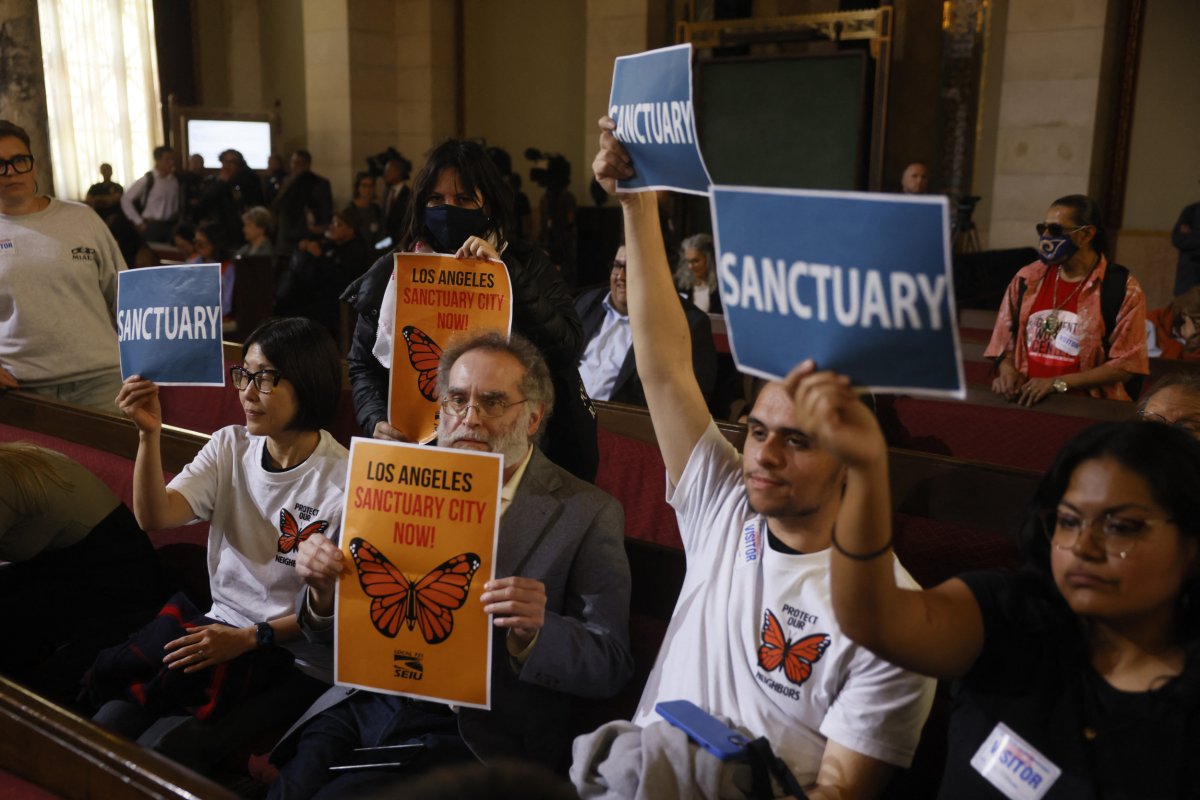Legal analyst and attorney Jonathan Turley wrote Friday in an opinion column for USA Today that sanctuary cities that resist President-elect Donald Trump’s deportation plans will likely draw more migrants to their communities, which could add to the costs of housing, education and other city services.
In addition, Turley wrote that the federal government also has the leverage to restrict funds to non-cooperative cities, impacting their budgets severely.
During the 2024 presidential cycle, Trump put immigration policy at the forefront of his bid for the White House, vowing to carry out the largest mass deportation program in United States history.
The president-elect, who is set to return to the Oval Office on January 20, has promised to implement his immigration agenda on Day One. His proposals include rebuilding the wall between the U.S. and Mexico and ending catch-and-release, the policy through which border officials release apprehended migrants into the U.S. to await court hearings.
In his opinion column titled, “Sanctuary cities resist Trump’s deportation plan. It could cost their residents,” the legal analyst highlights recent comments by Denver Mayor Mike Johnston, who made a strong stance against federal immigration policies, promising to prevent Immigration and Customs Enforcement (ICE) from operating in Denver.
Johnston even suggested a large-scale community resistance, likening it to a “Tiananmen Square moment.” His intense rhetoric, however, was tempered in follow-up interviews.
“Would I have taken it back if I could? Yes, I probably wouldn’t have used that image,” Johnston told Denver’s 9NEWS last month. “That’s the image I hope we can avoid. What I was trying to say is this is an outcome I hope we can avoid in this country. I think none of us want that.”
Newsweek has emailed Johnston’s office and Trump’s presidential transition team Saturday morning for additional comment.

AFP/Getty Images
Johnston’s stance is not isolated, Turley writes, as other city leaders, including those in Boston, have either reaffirmed or adopted sanctuary city policies, pledging not to cooperate with federal immigration enforcement. Some cities are even allocating municipal funds to legal defense for undocumented migrants.
California lawmakers are taking proactive steps to defend the state’s values and protect its immigrant community.
In a move aimed at ensuring the state is ready for any potential challenges from the federal government, the California legislature has kicked off a special session to provide additional resources for legal action if needed.
“We need to be prepared, and while we hope to collaborate and avoid litigation, we have a responsibility to California residents and taxpayers to make sure we’re not caught flat-footed,” Assemblymember Jesse Gabriel, who represents the San Fernando Valley and chairs the Assembly Budget Committee, previously told Newsweek.
Trump’s incoming border czar, Tom Homan, has vowed to be tough on states and cities seeking to fight mass deportations, promising to send twice as many ICE officers to Los Angeles—a sanctuary city.
California is perhaps uniquely equipped to square off against Trump’s new administration’s plans, as the state possesses the second largest Department of Justice (DOJ) in the country.
Following Trump winning the presidency last month, a post-election YouGov poll showed that a majority (73 percent) of Americans want deportation prioritization. The next Trump administration is expected to focus on deporting violent gang members, a move likely to gain public and political support, even in crime-afflicted sanctuary cities.
The emerging conflict between sanctuary cities and federal policies raises questions about state and federal government dynamics, particularly with regards to cooperation and funding.
Turley, a professor at George Washington University Law School, references the Federalist Papers and the U.S. Supreme Court’s 1997 decision in Printz v. United States to emphasize that while federal mandates requiring state assistance may be unconstitutional, the federal government also has the leverage to restrict funds to non-cooperative cities. Nevertheless, Turley warns in his opinion column, any financial sanctions must be careful not to cross the line into coercion, which the Court has previously cautioned against.
“Under constitutional law, the federal government cannot be a bully, but it does not have to be a chump,” the legal analyst writes.
Turley also writes there are legal risks for city officials who actively shield undocumented migrants. Under federal law, knowingly harboring undocumented migrants is a felony. This risk extends to private organizations working with sanctuary cities, who might also face legal liabilities.
Turley points out a paradox, noting that former President Barack Obama also asserted federal supremacy in immigration matters, particularly evident in the 2012 Supreme Court case Arizona v. United States.
In Arizona v. United States, the Court rejected key parts of an Arizona immigration law that sought to deter illegal crossings. Justice Anthony Kennedy wrote in the majority opinion at the time: “Arizona may have understandable frustrations with the problems caused by illegal immigration while that process continues, but the State may not pursue policies that undermine federal law.”
Turley concludes that the fervor of resistance might wane once the financial realities set in, and federal funding is threatened. He suggests that the strong rhetoric could give way to pragmatic cooperation as cities balance their ideals against fiscal imperatives.
There is no legal definition of a sanctuary city or state, but they refer to areas that decline to voluntarily assist federal immigration enforcement authorities, making it harder for undocumented migrants to be arrested and deported.
Some 13 states and more than 220 cities and counties already have some kind of “sanctuary” law or policy that limits cooperation with federal immigration authorities, according to the Center for Immigration Studies.





















